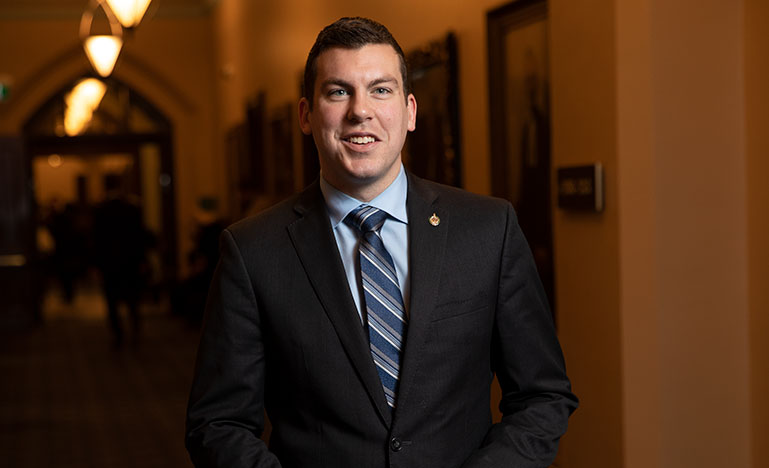Q & A with Kody Blois
The new MP for Kings-Hants brings a working-class family background and a young lawyer’s perspective to Parliament.

At 28 years of age, Kody Blois is one of the youngest MPs in the 43rd Parliament. Prior to being elected in October as a Liberal representing the riding where he grew up, he was a summer student, articled clerk and lawyer at McInnes Cooper in Halifax. A former junior and university hockey goaltender, he earned a J.D. from the Schulich School of Law at Dalhousie University in 2018.
CBA National: Can you talk a little bit about your background?
I grew up in a rural community in Hants County, a small community called Belnan. My father was a truck driver; my mom's an administrative assistant. I was the first person in my family to go to post-secondary education, let alone to law school or into the legal profession. My father was big on education, and he wanted me to pursue that and work hard. So that's that was my family upbringing, very blue collar.
My mom still works as the administrative assistant at the local elementary school. I joked during the campaign she might have been one of my best political assets because everyone knows my mother by virtue of their children going to the school.
I was very fortunate to have both my parents work hard to be able to allow me to play organized sports. I was a competitive hockey player and I was a draft pick of the Halifax Mooseheads (of the Quebec Major Junior Hockey League) back in 2008, and I played competitive softball and that was really my whole world.
I lost my father at a young age, when I was 14 years old. It reminds you of the strength of family and people around you. We were very fortunate in the East Hants area; we've got a great group of people that take care of one another.
CBA National: What caused you to choose the law?
I did an undergrad in commerce at St Mary's University in Halifax, and really enjoyed the program. I took a minor in political science at St Mary's and became really interested in public affairs generally and just the way the world worked. I saw law as a way to have a deeper understanding and appreciation for the decisions that are made in society. I thought, "what a great degree to get me a foundation that will serve me well in many different capacities."
CBA National: Did you have much interest in politics growing up?
It's very similar, in the same way my family did not have any background in law; my family also had no background in politics. It was not discussed around our dinner table. The way I found my way into politics was largely built on my legal training and foundation, because that naturally leads you into an interest in legislative activities, Parliament—but also my work in the community. After I was done my competitive hockey days, you take stock of what people had done for you to lead to where you are today. I had a number of people in my community that had given up their time to either help volunteer in hockey or be involved in other capacities, and I said I need to do the same. I started a number of non-profit organizations in my home community. I would say my interest in politics stemmed from my interest in community, coupled with my interest in law.
CBA National: What drew you to the Liberal Party?
I think if you look around the world right now, income inequality is right there with climate change as issues. When Justin Trudeau started talking about the importance of supporting middle-income families in 2015, it spoke to me and he brought a different style of politics in 2015. I identify as a centrist, and I certainly identified with some of the initiatives that the government was speaking of.
I would be remiss if I didn't say that I grew up in the legacy of Scott Brison, our Member of Parliament for 22 years. Scott was bigger than life and continues to be, so as far as I knew anything about politics or democracy, Scott Brison was my MP. Because of the work that I had done in the community, I had established a rapport with Scott. I looked up to him and I continue to look up to him.
CBA National: Why did you run at this point in time?
I would say because the opportunity arose. My father passed away suddenly at 44. That is a constant reminder that you do not know how long you've got in this world. And if you think you have something to offer, step up and do it.
I'm not naive to suggest that I know everything, but I believe that I have the ability through my life experience, my professional work, and my involvement in the community to offer something beneficial.
After Scott made his decision (to retire in 2019), I took a couple of weeks and asked myself if I would regret not putting my name forward. I came to the conclusion that I would, and so I jumped in with both feet.
CBA National: What are the issues that matter to you the most?
Growing up in a rural community, I really want to be a champion for promoting sustainable communities and in rural areas. We have challenges in Nova Scotia, and across the country, trying to retain young people and make sure there is a place for rural communities. Agriculture's extremely important, so I want to be an advocate for agriculture. We need to continue to work on climate change. We need to have a plan for the economy and the environment—those things have to go together. I think you see our generation really pushing for that, and as a 28-year-old MP, I need to be an advocate for that.
CBA National: Do you see the impacts of climate change in your riding?
Kings-Hants is home to the highest tides in the world. We have communities that are under threat from rising sea levels right in Nova Scotia. We have farmers that have never taken crop insurance over 40 years because they didn't need to—they have taken crop insurance three consecutive years because of frost in July. Changing weather patterns are wreaking havoc on our agricultural producers, which is the underpinning of our economy.
CBA National: What did you learn at McInnes Cooper and take away from your time there?
I spent three years at McInnes Cooper from a first-year student at Dalhousie University through getting the call to the bar and spending time as an associate. What I would say that is beneficial is the ability to take a large volume of information and come up with a sustained concept, or the theory of the case, or the key point. And time management. Law is a busy profession; so is the job of the elected official. I think those two worlds have taught me that ability.
I've got nothing but good things to say about my time at McInnes Cooper. I learned how to deal with clients, how to deal with individuals over the phone, how to manage expectations. All of that is completely transferable to the work that I am in now.
CBA National: What have you gained from your involvement in the Canadian Bar Association in Nova Scotia?
I would applaud the work that the CBA did in Nova Scotia as it relates to opportunities to engage and learn. We have a relatively small bar in Nova Scotia, so it served as a way to be mentored and to learn from other practitioners. Of course, there was continuous learning, and all of that served me well. It was important that the CBA membership was extended to law students to make sure they had a place and were connected to the association.
CBA National: What's the most surprising thing you've learned in your short time as MP?
The most surprising thing has been how quickly time flies. Government moves at a different pace than business—and for legitimate reasons because of accountability and democracy. Sometimes in the non-profit world, it's more direct to the flame, or even in the business world, things can move a little bit quicker. Sometimes you're thinking not in monthly increments, you're thinking more like, "in the next year I want to get this legislative agenda through." So, I think it's just adjusting to the reality of that.


